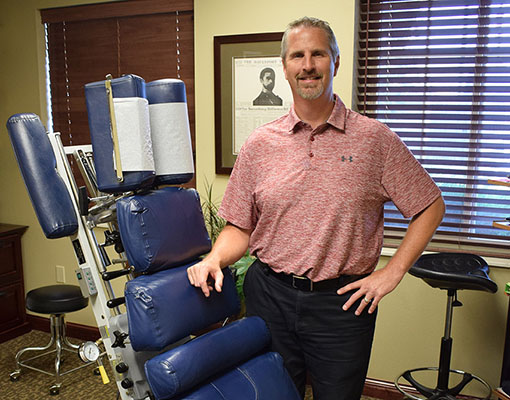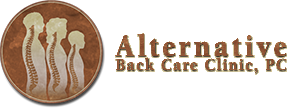Causes and Treatments
Shoulder and Upper Back Pain
ACROMIOCLAVICULAR (A-C) JOINT SEPARATION

The A-C joint is located at the top of the shoulder and formed from the union of the acromion (portion of shoulder blade) and the clavicle (collarbone). With direct trauma to the shoulder or a fall on an outstretched hand, the joint can be injured. These injuries are classified into three grades:
Grade 1: some tearing of the A-C ligamentGrade 2: slight rupture of the A-C ligament
Grade 3: tearing of the A-C ligament This type of injury results in a visible lump at the top of the shoulder which is due to the separation. Chiropractic care is very advisable for these injuries because all these grades are to be managed conservatively. Care in our office consists of taping, bracing, electric muscle stimulation, and rehab exercises.
ADHESIVE CAPSULITIS

The capsule of the shoulder joint is fibrous tissue that interconnects the muscles and tendons of the shoulder for support. This tissue can become degenerative; therefore the patient is usually over 40 years old. Initially the pain is moderate to severe with limited motion in all shoulder movements. Most of the time there is no specific event that caused it. The pain interferes with sleep. Most of the time the acute phase requires pain medication.
Chiropractic intervention is most effective in the later stiffening stages. Ultrasound and shoulder exercises are used in our office along with adjustments to any “fixed†joint related to the area. Improvement with conservative measures should occur over a 1-3 month period. Otherwise surgical intervention may be warranted.
BURSITIS AND TENDINITIS

Bursae are fluid-filled sacs in our joints that decrease the friction between tendons and bone. They are needed so that the tendon does not repetitively rub on the bone and become frayed. Abnormal movements of the shoulder causing changes in the proper alignment of muscles and tendons due to poor posture, repetitive motions, or direct injury, can inflame the bursae. All movements for the patient are painful. Early stages of chiropractic care include pulsed ultrasound and ice with rehabilitation following improvement.
Tendons connect muscle to bone and can become inflamed with improper motion or direct trauma. Care consists of pulsed ultrasound and ice with rehabilitation following improvement.
IMPINGEMENT SYNDROME

Impingement occurs to the shoulder when the the space between the ball and the socket in the shoulder joint becomes narrowed. This can occur due to abnormal shaped bones, degenerative changes, inflammatory process, or misalignment of the humerus (upper arm bone) into the joint. The pain is worse with overhead activities. It can also occur with repetitive "cocking" motions of the arm such as in pitching a ball. Chiropractic care involves adjusting any "fixed" joint related to area, ultrasound, electric muscle stimulation, and a rehab program. If the condition does not respond to conservative care in several months, an MRI may be helpful in determining any medical referral.
ROTATOR CUFF INJURY

The rotator cuff is a group of four muscles that support the humerus (upper arm bone) into the joint. These muscles are the: supraspinatus, infraspinatus, teres major, and subscapularis. The supraspinatus is the most commonly injured one of this group. Injury is usually traumatic and results in loss of motion and increased pain upon abduction (raising it out to the side) of the arm. Tears can be partial or full. Partial tears can be helped conservatively in our office with rehab conditioning exercises, ultrasound, electric muscle stimulation, and adjustments to supportive joints if needed. Full tears are referred for orthopedic consultation.
Why Choose Us?

Because Dr. Bunkers LOVES his job!
-
We do not
require lengthy treatment plans
-
We treat
neck and back problems, headaches, joint problems of the arms and legs such as shoulders, knees, etc.
-
We treat
the entire family from infants to senior citizens
-
We focus
on treating the problem and getting you functioning as soon as possible
-
We help
with your insurance questions
-
We will
refer out for second opinions if your condition does not improve
